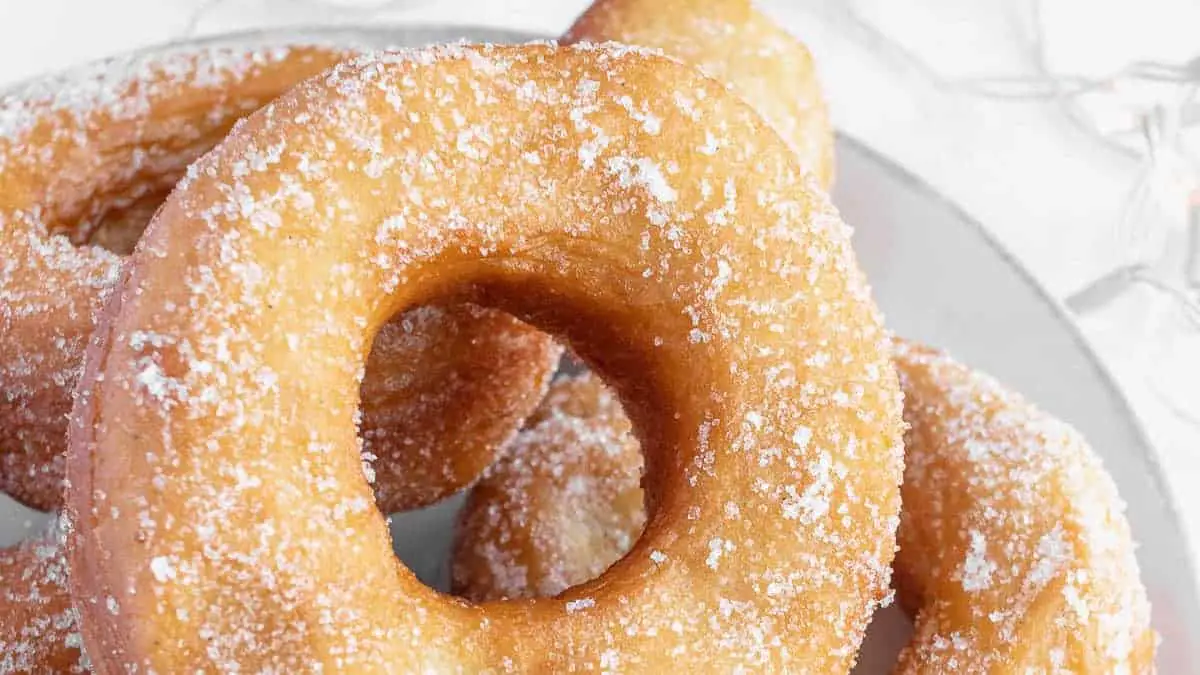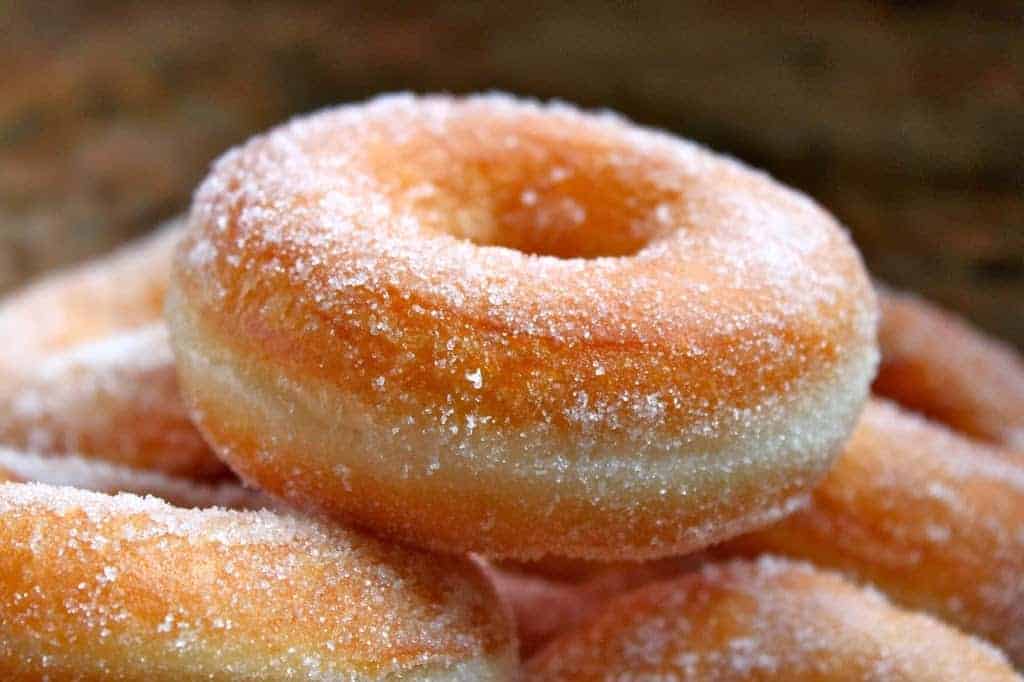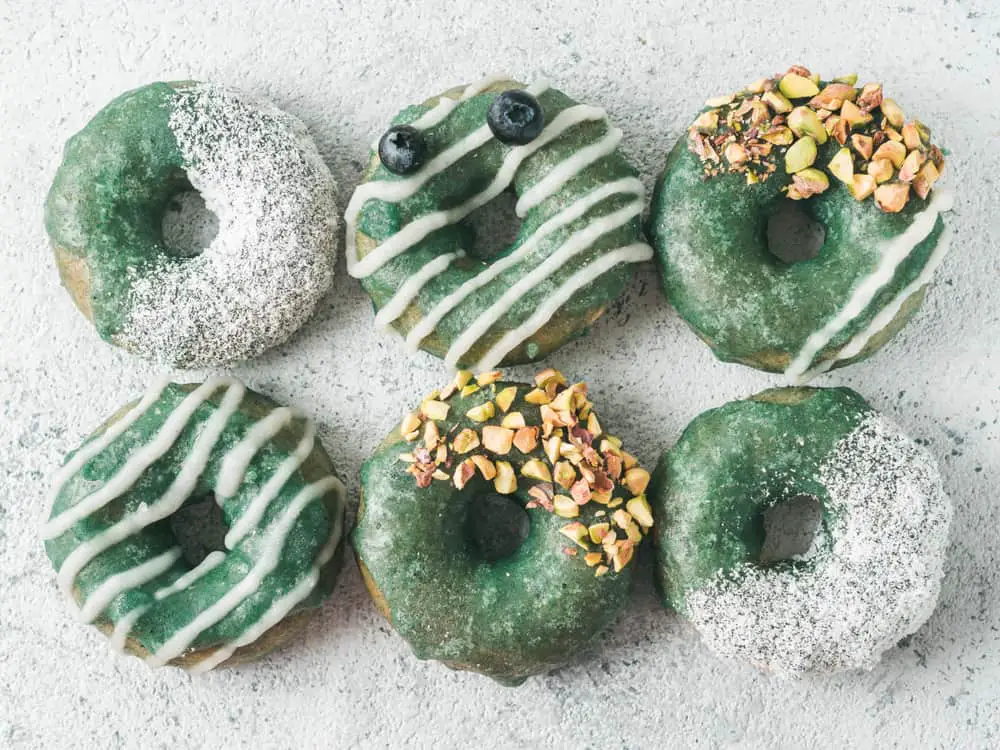We want to swiftly respond to the topic of whether donuts are vegan before we begin the article. Nope! They are not vegan because a number of their primary ingredients come from animals or are produced from animals.
However, that does not imply that a vegan should stop enjoying this delectable dessert that has won over people worldwide.
Donuts are a staple of contemporary pop culture, and while their original recipes may not be vegan, with a little ingenuity and resources, anyone can adapt any recipe to become vegan.
Not only will you find a delectable recipe for vegan doughnuts to add to your collection, but we’ll also go over all there is to know about this sweet treat, including why it’s essential to understand how to make them at home and how they may benefit you and your family.
About Vegan Donuts
Traditional donuts, as we previously stated, are not vegan by nature, but due to the widespread consumption of this food in contemporary culture, vegan alternatives have to develop to satisfy the needs and desires of a market that is also experiencing rapid growth.
It is vital to adapt in nations like the United States, where 10 billion donuts are produced annually, and where fast-food giants like Dunkin’ Donuts, Krispy Kreme, and Tim Hortons are expanding their empires globally, as that same nation is home to the second-most vegan city in the world.
The largest city in the US for vegans is Portland, Oregon. Bristol comes in third, then Berlin and Hamburg.
Yes, as you may have seen, veganism is becoming more and more popular all over the world. The capital of Germany, for instance, is one of the cities most dedicated to this kind of cuisine, with more than 400 vegan and vegetarian eateries.
According to Vegetarierbund Deutschland, there were almost 8 million vegetarians in Germany by the year 2015 or roughly 10% of the country’s population. According to the aforementioned organization, this sector in Berlin specifically accounts for about 5% of the city’s population.
And if you’re curious about which nations have the highest percentage of vegans, the UK (United Kingdom) comes in first, followed by Germany, Austria, Israel, and Australia.
All of these nations adore doughnuts, and several of them have been eating them for centuries.
Just keep in mind that the donuts’ original name, Olykoek, which translates to “oily bread” and hails from Holland, was given to them before they were so successfully imported to North America.
As a result, businesses are starting to alter their products to satisfy customers’ requirements and demands as people’s eating habits change.
It used to be difficult to find vegan donuts, but not any longer. Additionally, the same food companies are introducing new vegan lines, thus the number of vegan items available in supermarkets has increased.
This is the intriguing case of Dunkin Donuts, which last year shocked social media by unveiling its new 40 vegan donut flavors. They are now available for purchase in Belgium and the Netherlands, but they intend to spread throughout all of Europe.
They offered fresh varieties like Peanut Butter and Jelly, Strawberry and Cream, Chocolate Chip, and the Banana Rainbow in addition to the chain’s signature standard tastes.
So don’t be discouraged; soon you won’t just be able to get freshly baked vegan donuts in a variety of flavors at your favorite donut shop, but you’ll also be able to make your own at home.
How Are Donuts Made?

Donuts are a relatively straightforward but delectable food. In layman’s words, we may say that it is a sweet dough that has been fried or baked after being fermented with yeast or baking powder (depending on the recipe).
It should be noted that the original doughnut recipes call for frying, however many different baked donut recipes have been developed to make the recipe a healthier treat.
However, most donuts, whether they are baked or fried, will contain the following ingredients: eggs, butter, and milk, which are not permitted if you want to follow a vegan diet.
According to the recipe, the frostings may also contain butter or milk, which makes them even less vegan-friendly.
Other Non-vegan Ingredients
Being vegan often refers to a full way of living and a philosophy of life, not just quitting eating meat and other animal products.
One of the numerous benefits of becoming vegan is to end the cruelty that our species exhibits against other types of life on Earth. Some people choose to live this lifestyle after realizing that our current eating patterns cannot be sustained.
Because of this, there are two additional ingredients in the donut recipe that are subject to fierce criticism from vegans. vegetable oil with sugar.
Sugar
Sucrose is sugar. This disaccharide sugar, which is present in many plants, is made up of glucose and fructose. Being the two main sweeteners on the global market, sugar cane and sugar beet. After that, slices of the cane or beet are cut, and the juice is squeezed out.
After being extracted in its raw state, the juice is cleaned to create beet molasses, which is then cooked. The sucrose is centrifuged after it has crystallized and been heated. to separate the liquid from the sugar.
It is then delivered to a refinery. a location where it is filtered using charcoal derived from butchered cow and pig bones. By doing this, the crystals become whiter and are cleared of any leftover contaminants, including molasses.
Depending on how it is made, sugar can be vegan. Additionally, organic sugars are available; they are controlled by a body that verifies that only processes of vegetable origin were used in their production.
Vegetal Oil
Although vegetable or palm oil is a vegan ingredient, vegans are increasingly turning away from it for various reasons.
Obtainable from the fruit of the palm tree, palm oil is a type of fat (yes, it seems logical). It is the oil that is produced the most extensively around the globe after soybean oil.
It is indiscriminately used in industrial baked goods, cereals, bread, fried dishes, cosmetics, and home goods. It is present in many goods that are both vegan and certified organic.
It is reportedly one of the least expensive oils available, and because it remains solid at room temperature, it gives processed goods more texture.
We might be shocked to learn that, although being a vegetable oil, it can harm the animal kingdom so severely. As it turns out, the production of palm oil has a terrible effect on the environment, leading to deforestation, the destruction of natural ecosystems, and the extinction of animals like orangutans, rhinos, elephants, and tigers, among others.
One of the main effects of the production of palm oil is deforestation. Even in protected natural areas like national parks, the United Nations Environment Program (UNEP) confirms that plantations are erected unlawfully.
According to a study by Princeton University (USA) and the Swiss Federal Institute of Technology, between 1990 and 2005, the increase of this crop in Malaysia and Indonesia was made at the expense of tropical forests by between 55% and 60%.
Conversely, the indiscriminate use of herbicides, traps, and electric fences, as well as the hunting of animals that eat crops, have both done significant harm.
Approximately 315,000 orangutans lived in the wild in 1900; currently, there are less than 50,000 of them living alone or in tiny groups, and they may go extinct in ten years.
In addition to the reckless use of pesticides, the production of palm oil results in the release of CO2 into the environment.
Everything mentioned here accelerates air pollution and climate change. The primary explanation is that forests serve as carbon sinks by sequestering carbon dioxide, one of the primary greenhouse gases responsible for global warming.
As is generally known, many vegans follow this diet in addition to their desire to abstain from eating meat to support and advance a certain viewpoint.
the notion that humans can alter our behaviors that are bad for the environment and other animals with which we coexist.
Being able to contribute to better resource management and ensuring that both our existence and the earth’s sustainability are personal commitments to the world.
Vegan Donuts Recipe

Now that we have reached the most delicious section of the post, let’s share the recipe so you can prepare your vegan donuts at home. We’ve also included a few options for your donut decoration.
Ingredients:
- 1 and 1/3 cups oatmeal or ground oats in your blender(Can be replaced for all-purpose flour)
- 1 tsp cornstarch or cornstarch
- 1 tsp of baking powder
- 1 tsp baking soda
- 1 pinch of salt
- 1 pinch of nutmeg
- 1 tsp vinegar (you can use white or apple)
- approx. 12 medium dates, pitted and cut into small pieces
- 1/2 cup vegan milk (soy milk, almond milk, coconut milk)
- 1 tsp vanilla
- 4 tablespoons of water
In place of the vegan milk and 4 tablespoons of water listed in the ingredients, you can use 1/2 cup of a liquid sweetener (such as agave, maple, or brown sugar) if you don’t have dates.
If you’re planning to use dried sweetener (sugar, muscovado, or stevia), eliminate the 4 tablespoons water and use around 5 tablespoons sweetener and 1/2 cup non-dairy milk.
Instructions
- If you don’t have a high-speed processor, I suggest letting the chopped dates, vanilla, non-dairy milk, and 4 tablespoons of water soak in a bowl the previous evening.
- To remove lumps and thoroughly combine the ingredients, first strain the dry ingredients through a sieve (return any oat fiber that is still in the sieve to the container).
- Transfer the dates to a container if you soaked them in vegetable milk, water, and vanilla. Then pureed using a hand blender (you can do it in the normal blender if you do not have a hand blender).
- Add the date puree (or the sweetener that you are going to use) to the dry ingredients until it forms a thick and uniform mass.
- Clean the donut mold with a lightly oiled napkin. Then pour batter into pans; you can do it with a spoon or with a pastry bag for greater comfort.
- Bake at 180ºC for 10 to 15 minutes or until your whole house smells delicious and you see that the edges of the donuts are already slightly golden.
- Let them cool very well; once you can remove them from the mold, let them finish cooling out of the mold.
Options for Decoration

One of the most enjoyable aspects of preparing donuts is decorating them, therefore we offer a variety of vegan donut glazes.
Simpson-style
- Soak 1 cup of cashews overnight.
- Remove the water the next day, and give them a thorough rinsing.
- In a bowl, combine them with 1 teaspoon of vanilla.
- Add a few drops of the dates’ soaking water to 1 or 2 dates to sweeten.
- To liquefy the nuts when using a dry sweetener, gradually add vegan milk. It is not required if you’re using liquid sweeteners.
- Process with a hand blender until creamy.
- Add 1 to 2 teaspoons of grated beets and blend again until you chive the desired color.
- To decorate the donuts you just have to dip a donut in the cream. Help yourself with a dull knife to cover the sides of the donut with the cream
- Decorate with colored sprinkles.
Chocolate Glaze
- One or two teaspoons of vegan honey should be thoroughly combined with one or two teaspoons of cocoa powder in a small container to create a thick and delectable syrup.
- The syrup is then applied to the doughnut, and finished!
- Place the doughnut on a rack with a tray underneath so that any extra syrup drips onto the tray.
Final Words
We hope that this vegan donut recipe will motivate you to start looking for more and eating healthier.
We also hope that this article has made you more aware of how our eating choices have an impact on the environment and the things we can do to assist bring about change.
Last but not least, we invite you to tell us about your experience and how your recipe turned out.

